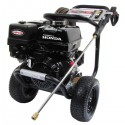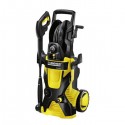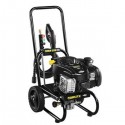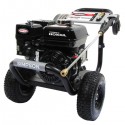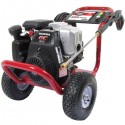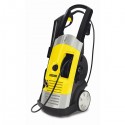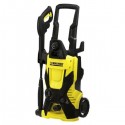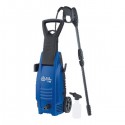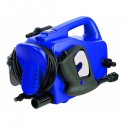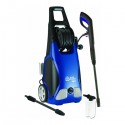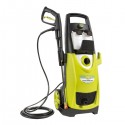Pressure Washer Buying Guide
These are the 10 best pressure washers based on product quality, customer satisfaction, and price:
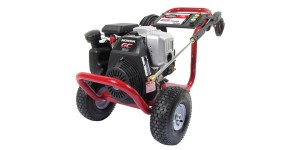 Choosing a new pressure washer can be a big task. Pressure washers have a wide variety of applications – everything from washing down your car or SUV right up to really big jobs like stripping paint off walls and washing up at heavy duty work sites. There are small handheld electric pressure washers that you can carry with you while you knock out small jobs, as well as residential pressure washers designed to take care of moderately sized jobs around the household.
Choosing a new pressure washer can be a big task. Pressure washers have a wide variety of applications – everything from washing down your car or SUV right up to really big jobs like stripping paint off walls and washing up at heavy duty work sites. There are small handheld electric pressure washers that you can carry with you while you knock out small jobs, as well as residential pressure washers designed to take care of moderately sized jobs around the household.
Then there are commercial grade pressure washers, designed for use on tough jobs at contracting sites, construction and demolition sites, or for landscaping crews. There are gas and electric powered pressure washers, models that are able to provide hot or cold water sprays and models that run on cold water only. There are pressure washers that siphon detergent from its original bottle to add to the spray of water, and models that have onboard reservoirs that can allow you to take detergents and chemical solvents with you as you move around the job site, cleaning various surfaces.
Pressure washers have a lot of different applications, and they can be really useful no matter what you want to use them for. Around the house, you can use an electric residential pressure washer to spray mold off of your shower tiles and clean stainless steel work surfaces in the kitchen or basement. For these kinds of jobs, a smaller, more compact pressure washer with a lower PSI and flow rate will be just fine.
Around the yard and outside of the house, there is no end to all of the different applications you can use a residential pressure washer for. We already mentioned that you can use one of these machines to wash your car or SUV, but you have no idea how much easier it is with a residential pressure washer. You can include detergent in the spray to blast dirt and mud off of the car’s finish, and then switch over to a cold water spray to rinse the soap off. Your car will be looking like it was professionally cleaned in a matter of minutes.
Residential pressure washers have all kinds of other applications as well. You can use them to spray down vinyl or aluminum siding and clean mold and moss off of brick walls. You can quickly and easily rinse off your second story windows without having to climb up on a ladder to do it with a residential pressure washer. You can clean your garage and fences in no time. And around the yard, you can spray down your grill and lawn furniture with one, as well as keep your garden tools and lawn mower free of grass and mud.
Gas powered and commercial grade pressure washers are an excellent asset to have on the job site. Tasks that would take a crew of workers several hours to finish up – such as stripping paint off of walls to prep them for painting, or cleaning up plaster dust or other dirt from demolition or construction – take mere minutes with a commercial pressure washer. These machines provide extra high PSI and flow rates that can strip unwanted detritus from just about any surface in no time at all. And because they can provide hot water sprays as well, you can use them to blast through materials that are not water soluble or sanitize work areas.
As you can see, there are a lot of applications for pressure washers – but there are a lot of options as well. It can be difficult to decide which kind of pressure washer is right for your needs, especially if you have never used one before and you are not familiar with just how many different jobs they can be applied to. But you are in luck: with this guide you will soon be able to figure out exactly what you need to use the pressure washer for – which will narrow down the field considerably – and then concentrate on more specific aspects of the machine, such as how much pressure it is providing, and the difference between PSI and Flow Rate and why these are important.
After you have gotten the most important considerations out of the way, you can further decide on what kind of pressure washer is right for you based on concerns like how durable its parts and manufacturing are, what kind of accessories it has, and how big and bulky it is. Soon you will know exactly what to look for.
1. Choosing the Right Pressure Washer
1a. Which Kind?
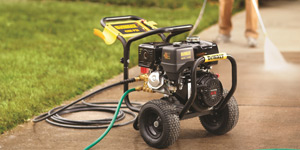 The type of pressure washer you should be looking for depends primarily on what you intend to use it for. If you are a contractor or own a landscaping business, and you want a pressure washer you can use on the job site, then you should be looking at gas powered and commercial pressure washers. These machines have the highest PSI and Flow rates, and they can be used just about anywhere, regardless of whether there is a power outlet.
The type of pressure washer you should be looking for depends primarily on what you intend to use it for. If you are a contractor or own a landscaping business, and you want a pressure washer you can use on the job site, then you should be looking at gas powered and commercial pressure washers. These machines have the highest PSI and Flow rates, and they can be used just about anywhere, regardless of whether there is a power outlet.
If you are looking for a pressure washer to use around the home, a residential model is your best bet. These are available as gas or electric powered pressure washers. They still provide a high enough PSI and flow rate to tackle just about any job you could think to use them for around the house. So first of all, determine where you will be using your pressure washer, and then go from there.
1b. Pressure and Flow Rate
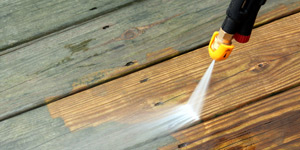 Once you have decided which kind of pressure washer you will buy, the most important thing to look at on individual models are their relative PSI and flow rates. These are the metrics that will influence the pressure washer’s performance more than any other. PSI – or Pounds per Square Inch – measures the maximum force with which the water spray will strike the cleaning surface. But you cannot simply find the model with the highest PSI and call it a day.
Once you have decided which kind of pressure washer you will buy, the most important thing to look at on individual models are their relative PSI and flow rates. These are the metrics that will influence the pressure washer’s performance more than any other. PSI – or Pounds per Square Inch – measures the maximum force with which the water spray will strike the cleaning surface. But you cannot simply find the model with the highest PSI and call it a day.
Flow rate is equally important. The pressure washer’s flow rate is measured in Gallons per Minute – or GPI – and it determines how much water is in the spray. A pressure washer that has a very high PSI and a low GPI will have a strong spray, but it will be pencil-thin. To accurately assess the cleaning power of the unit, multiply PSI by GPS, and compare the result to other models.
1c. Is it Tough Enough?
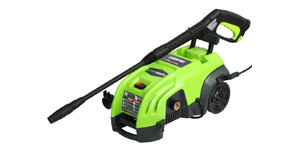 But you do not just want a pressure washer that can provide high cleaning power. You also want to make sure that it is tough enough to hold up to the rigors of regular use. This is especially true if you are looking for a pressure washer to use on job sites – you know all too well what kind of accidents can happen when you are remodeling a new home, and you want to make sure the pressure washer will not be wrecked if it gets dropped or knocked over.
But you do not just want a pressure washer that can provide high cleaning power. You also want to make sure that it is tough enough to hold up to the rigors of regular use. This is especially true if you are looking for a pressure washer to use on job sites – you know all too well what kind of accidents can happen when you are remodeling a new home, and you want to make sure the pressure washer will not be wrecked if it gets dropped or knocked over.
As a result, the durability of the parts the pressure washer is made with will play a big role in its ability to last for the long term. For commercial pressure washers, this means steel; for residential pressure washers, durable plastic is fine – but make sure the connections on the model are made of brass, not plastic, which tends to leak.
1d. Gas or Electric?
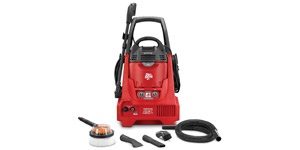 You will have to decide whether you want your pressure washer to run on gas or electric power, and this is a more important consideration that might be apparent at first. Each one has its own particular advantages and drawbacks. With a gas powered pressure washer, you will have a much greater range of motion – you do not have to always find the nearest power outlet to run it, which can be really useful on job sites that are not wired for electric yet.
You will have to decide whether you want your pressure washer to run on gas or electric power, and this is a more important consideration that might be apparent at first. Each one has its own particular advantages and drawbacks. With a gas powered pressure washer, you will have a much greater range of motion – you do not have to always find the nearest power outlet to run it, which can be really useful on job sites that are not wired for electric yet.
But gas pressure washers are noisy and produce a lot of emissions, which can be a big problem. If you are using your pressure washer in an enclosed space, you do not want it to be spewing out harmful fumes. And many gas pressure washers are not CARB compliant, which means you cannot buy them in those several other states that enforce those regulations. Also, electricity is cheaper to run than gas.
1e. The Small Stuff
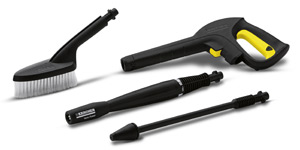 Finally, you should look at the small details on any pressure washer you are considering purchasing, because it is in the details that the quality of performance on any machine really lies, once you have gotten the big stuff like PSI and power source out of the way.
Finally, you should look at the small details on any pressure washer you are considering purchasing, because it is in the details that the quality of performance on any machine really lies, once you have gotten the big stuff like PSI and power source out of the way.
Your pressure washer should be designed in such a way that it is not so heavy or bulky that it will not be easy to maneuver in and out of your garage or work truck. It should have a sturdy roll cage to protect it from falls or other accidents. And it should have big wheels to help stabilize it and give it extra traction on wet, slippery surfaces.
There should be convenient accessories, like reservoirs for holding soap and spots for winding up and storing the power cord and hose. And you should have plenty of options for different PSI available in order to make it as versatile as possible.
2. Pressure Washer Types
2a. Electric Pressure Washer
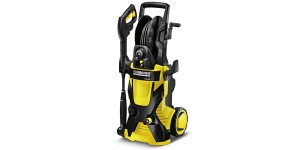 An electric pressure washer is a great little machine with plenty of advantages. Whether you are looking into electric pressure washers because you are concerned about the amount of carbon emissions your household or contracting business are producing, or you just prefer the convenience of a noise and emissions free machine that is as easy to operate as plugging it in, electric pressure washers have a lot to offer their users.
An electric pressure washer is a great little machine with plenty of advantages. Whether you are looking into electric pressure washers because you are concerned about the amount of carbon emissions your household or contracting business are producing, or you just prefer the convenience of a noise and emissions free machine that is as easy to operate as plugging it in, electric pressure washers have a lot to offer their users.
Electric pressure washers languished for many years in the shadow of the bigger and more powerful gas powered pressure washer, but lately they have been really starting to catch up. Now, there are plenty of electric pressure washers available on the market that have PSIs and flow rates that are quite comparable to a lot of what is offered from other models. Because of that, you do not really have to take too much of a cut in terms of cleaning power if you opt to buy an electric pressure washer.
Electric pressure washers also have the distinct advantage over other types that they are far and away the least expensive models on the market. So if your business has razor thin margins, or if you are simply buying a pressure washer to use around the home and your household is on a tight budget, an electric pressure washer can save you a bit of money on the initial purchase price.
Electric pressure washers have the distinct advantage over gas powered ones that they do not produce any emissions at the point of use. That means they can be used indoors safely; if you are looking for a pressure washer to use in a professional setting like cleaning a restaurant kitchen or to use in an auto body shop, an electric model is going to be able to be used here without requiring you to wear a respirator. And you never have to worry about your electric pressure washer being compliant with state emissions standards.
As with any pressure washer, you should try to find an electric model that has a high cleaning rating (PSI x GPM). There is no reason to sacrifice pressure or flow rate when you are buying one of these machines. All of the other general criteria for finding a good pressure washer also apply to electric models, but there are a couple of criteria specific to these machines that you should keep in mind as well.
The motor on the electric pressure washer should be powerful enough to provide a high performance spray, but not so powerful that you are at risk of overloading your circuit breaker. That means it should fall somewhere between 12 and 14 amperes. And make sure the electric pressure washer has a power cord that is sufficiently long – just because you are tethered to a power outlet does not mean you should be overly limited in your range of motion. Try to find an electric pressure washer that has a power cord that is at least 25 feet long.
2b. Gas Pressure Washer
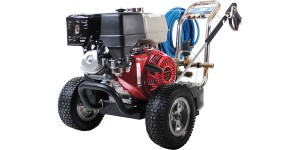 If you want to step up slightly in terms of power and performance from electric pressure washers, the next level is gas powered models. Gas pressure washers are available for both residential and commercial use, and they have a wide range of applications for both categories. In most cases, when you are looking for a pressure washer to use on the job site – whether it is for painting and decorating, demolition, remodeling and construction, or landscaping – a gas powered pressure washer is definitely the best bet.
If you want to step up slightly in terms of power and performance from electric pressure washers, the next level is gas powered models. Gas pressure washers are available for both residential and commercial use, and they have a wide range of applications for both categories. In most cases, when you are looking for a pressure washer to use on the job site – whether it is for painting and decorating, demolition, remodeling and construction, or landscaping – a gas powered pressure washer is definitely the best bet.
This is especially true if your jobs tend to be the kind that you can perform outdoors, since you will not have to worry about concentrating fumes in an enclosed space. And even if you do have to use your gas pressure washer indoor on a remodeling job occasionally, provided you make sure the area is very well ventilated first, you will not have to worry too much about fumes. There is the concern of finding a gas pressure washer that does not produce so many emissions that it is not compliant with California Air Resources Board carbon standards, which are enforced in fourteen states. But models certainly are out there that fall into these requirements; it’s just a matter of finding one.
On a gas pressure washer, beyond the primary considerations of PSI and flow rate, one of the most important things to look at is the make and model of the machine’s engine. You want to be able to count on your pressure washer for the long term – especially if you are using it often on tough jobs – so you need an engine that is going to provide reliable power and performance for many years to come. Do not settle for a cheap machine that has a poorly made engine by an unknown manufacturer under the hood. If you do, you will be sorry in the long run.
Make sure the engine, if it is not made in-house by the pressure washer designer, is made by a reputable company with a track record of quality. These include names such as Briggs & Stratton, Kawasaki and Honda. But you should also look at the engine specs to make sure it is one of the more powerful ones available in your price range. Look carefully at the engine displacement; this is measured in cubic centimeters (ccs) and tells you how much internal volume is being swept by the pistons on each cycle. Along with horsepower – which is a more general scale of power that most readers should be familiar with – the displacement is the single best measure of power on a gas engine.
Make sure the engine is relatively fuel efficient; gas is not cheap these days, and you do not want to be pouring money into a machine that does not run efficiently. Generally, two-cycle engines are somewhat more fuel efficient than four-cycle ones, and they are quieter and produce fewer emissions as well. But four-cycle engines have the advantage that they offer more power.
2c. Residential Pressure Washer
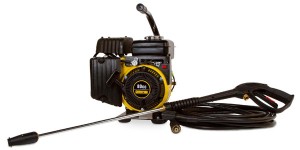 Residential pressure washers are perfect for the homeowner who has a variety of cleaning jobs around the house and yard, but who does not have a whole lot of time on their hands to get them done. There are limited hours in the day – and limited days in the weekend – and a lot to do to keep a home and garden looking great.
Residential pressure washers are perfect for the homeowner who has a variety of cleaning jobs around the house and yard, but who does not have a whole lot of time on their hands to get them done. There are limited hours in the day – and limited days in the weekend – and a lot to do to keep a home and garden looking great.
Not only do you have to keep your lawn well manicured and free of weeds, you have to keep the walls and windows of your house from collecting grime and dirt, make sure your car or SUV is washed and sparkling (and if you are like most of us, you have a car and an SUV), clean the grill and patio furniture if you are having company over, and wash down the deck periodically. This is a lot of work, and it can add up quickly.
That is why a residential pressure washer is such a great tool to have in your garage – with one of these machines on your side, you can cut the amount of time it takes to finish just about any household cleaning task in half at the very least, and probably shorten it by a lot more. There is virtually no cleanup job around the house that is too big or too small for a residential pressure washer. Once you own one, and have used it on a few basic cleanup jobs, like washing your siding or cleaning your driveway, and you have seen how fast it finishes jobs like those, you will soon be eagerly searching for new ways to use your new residential pressure washer elsewhere.
Residential pressure washers have somewhat lower PSIs and flow rates than the average commercial pressure washers, but they still pack more than enough cleaning power to easily tackle pretty much any job you can find for them. These pressure washers have PSIs that start at about 1500 (on smaller electric models) and can go as high as 2500 (on heavy duty gas models). Even at the lower levels, that is much higher than what you would get from a coin-operated car wash sprayer. 1500 is a strong PSI to work with, and there are virtually no stains you cannot get rid of with this kind of pressure, especially if you combine it with a strong chemical detergent.
But because they have PSIs that are a bit lower than what are available on commercial pressure washers, residential pressure washers have the added advantage that they are a lot more compact and lightweight than their heavy-duty cousins. That means you will have no trouble maneuvering them around the house or finding enough storage space for them in your garage or on a shelf in your basement. You get all of the cleaning power you need in a manageable package. Take advantage of this fact by shopping for a unit that has a high cleaning power rating but also has a compact footprint and does not weigh too much.
2d. Commercial Pressure Washer
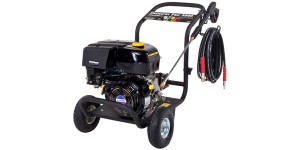 Commercial pressure washers are the beast of the cleaning world, with extra high cleaning power ratings, heavy duty materials used in manufacturing their various components, and the ability to produce high pressure sprays that can be as hot as 200 degrees Fahrenheit on many models. When you own a big contracting business that has a lot of tough cleanup projects on the job site, you want a commercial pressure washer in your truck. These machines have a wide range of sizes and power ratings, too – there are even models that do not go in the truck but actually have to be mounted on it. These huge machines carry their own water reservoirs most of the time, and are intended for the biggest job sites.
Commercial pressure washers are the beast of the cleaning world, with extra high cleaning power ratings, heavy duty materials used in manufacturing their various components, and the ability to produce high pressure sprays that can be as hot as 200 degrees Fahrenheit on many models. When you own a big contracting business that has a lot of tough cleanup projects on the job site, you want a commercial pressure washer in your truck. These machines have a wide range of sizes and power ratings, too – there are even models that do not go in the truck but actually have to be mounted on it. These huge machines carry their own water reservoirs most of the time, and are intended for the biggest job sites.
Small contractors will be well equipped if they purchase a standalone commercial pressure washer, however. These machines are able to produce PSIs that are well above 2800, and can strip paint off of metal and concrete surfaces – whether the paint is loose or not. These pressure washers can keep your fleet of zero turn mowers clean and free of mud and grass if you own your own landscaping business. You can use one to quickly clean paint out of brushes and rollers – a job that can take a lot longer if you are just using a hose. And you can clean up demolition and renovation sites in a matter of minutes with a commercial pressure washer.
The key to finding the right commercial pressure washer is to make sure that it not only has the highest PSI and flow rate you can find in your price range, but also the kind of durable, high performance engine that can back that up. There is no reason to move into the more expensive echelons of commercial pressure washers if you do not intend to find one that has the kind of extra high cleaning power rating that will make it worth it.
And you do not want a commercial pressure washer to have a high cleaning power rating if it does not have an engine that will stand up to tough jobs over the long term. The very same selection criteria that apply broadly to gas powered pressure washers are particularly critical here: you want a machine with a powerful, high performance engine made by a trusted manufacturer.
And because you will be using your commercial pressure washer on busy, dangerous job sites, the quality of its materials is more important than ever. You want a machine that is made of steel. Stamped steel will do just fine, although welded steel is tougher. Make sure it has a tough hose made of PVC plastic and solid pneumatic tires. It should also have a protective roll cage to make sure it does not get damaged if it is knocked over or if anything is dropped on it. Finally, as with any pressure washer, the accessories are going to make this one more versatile, allowing you to use it for a number of different tasks and on different job sites.
These are the 10 best pressure washers based on product quality, customer satisfaction, and price:

